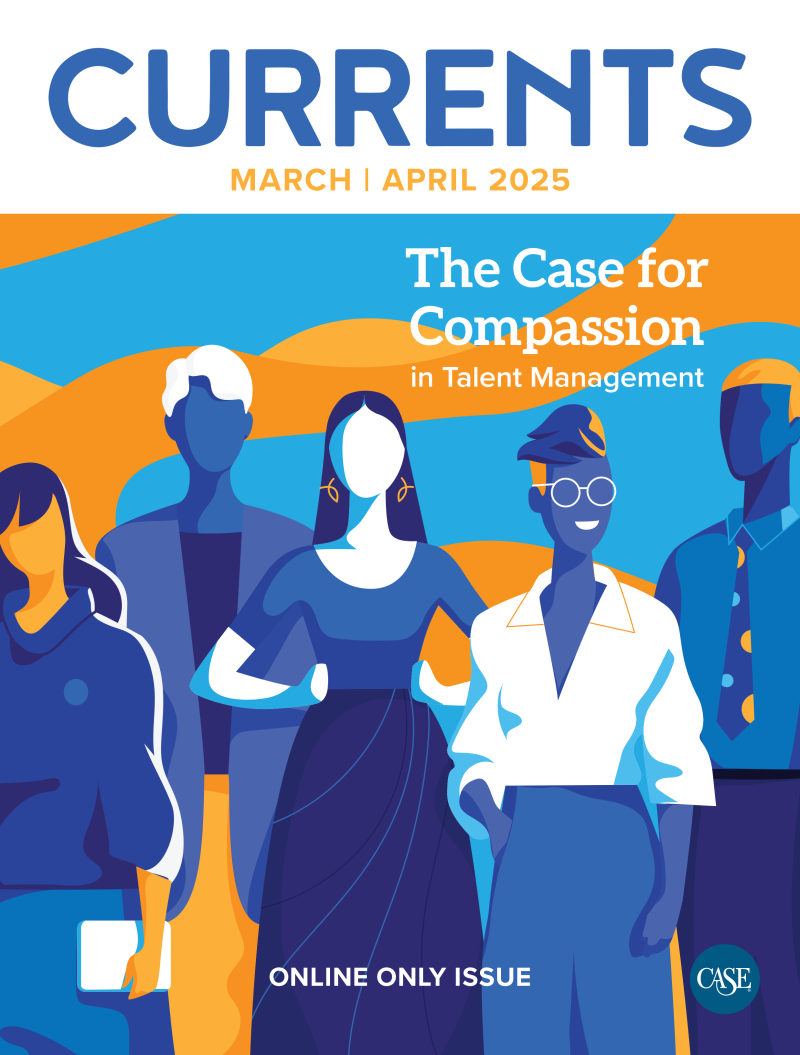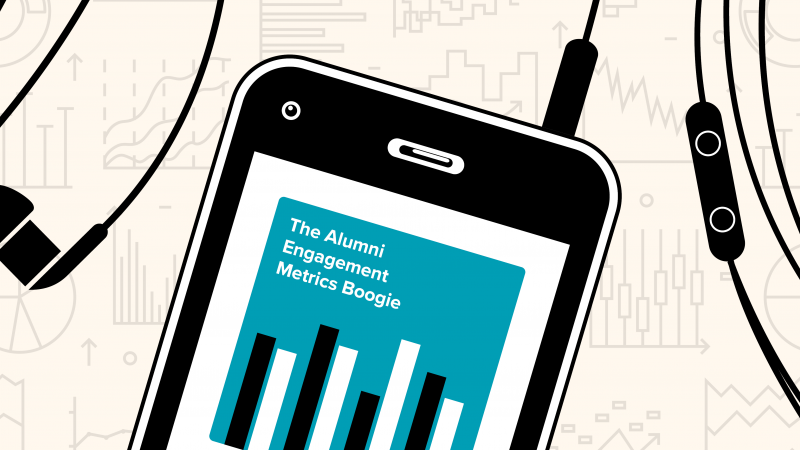Talking Shop: A Passion for Data

Amanda Jarman
President, Fundraising Nerd
Amanda Jarman is the founder and president of Fundraising Nerd, a consulting firm that helps nonprofit organizations optimize their donor data and data management systems. Before launching her company, she served in various fundraising data-related positions, including as Assistant Vice President for Advancement Services at Portland State University (Oregon, U.S.), and as Associate Director of Advancement Services at Lewis & Clark College (Portland, Oregon). She started her fundraising career at smaller nonprofits. Jarman is a frequent trainer and presenter on fundraising data, and is a CASE Crystal Apple Award recipient.
She also advocates for greater awareness of people with neurodiversity. In December, she was a co-presenter for a CASE webinar on the topic.
How did you come up with the name Fundraising Nerd for your firm?
I had a blog for about four years by that name. The name sort of sprung organically to mind, and it was perfect because it combined my love of both fundraising and data. I wanted to emphasize both parts—what it feels like to be on the front line of fundraising and then bringing in that data science, nerdy part of it—putting those two things on an equal footing. So when I decided to start my firm in 2013, I already had a name.
You had reached a high level in higher education advancement. Was it daunting to start a consulting firm?
Absolutely! It was like diving into deep water where I wasn’t sure how it would go. What if no one hired me? I can live off the food I grow in my urban garden, right? But I was immediately super busy. There was this pent-up demand. If I had started my company a few years earlier, that [demand] wouldn’t have been there. The time was right. People were really understanding their data as an asset. So it gave me a little bit of a smoother landing.
And the timing for me was right as well. I was ready to have more flexibility in my life and to be able to determine my own priorities for where I was spending my time and what life looked like for me. The way to gain that freedom was starting my own company.
How did your career in higher education advancement prepare you for running your own consulting firm?
I started out in small nonprofits and, of course, in a smaller organization, you do everything. That’s where I had the chance to write grant proposals, write donor appeals, and have face-to-face time with donors, along with database work. I saw an interesting job opening at Lewis & Clark College. I thought, “I’m good at databases and also good at fundraising. I think I can do it.” They took a chance on me because it was for a prospect research job, which I hadn’t done before. I’ll always be grateful for that. When I started at Lewis & Clark, the world of data modeling and mining was new. The technology was advancing rapidly. And I immersed myself in it with passion.
Soon after, I attended my first CASE conference for development researchers in 2006 in Boston. It was eye-opening and wonderful. CASE has been foundational to me in terms of acquiring skills and networking.
Now, I’m a frequent speaker at CASE’s Gifts and Records Workshop. One of the things we talk about is how we’ve evolved from the idea of people in a back office entering information into a system. Very little manual data entry goes on these days. Our jobs have become elevated—understanding and interpreting data in terms of strategies. There are so many juicy and amazing things we can tease out of data. And I love that. I love doing deep dives into data—it aligns so perfectly with how I process information.
That’s a great segue to our next topic. You’ve been vocal about neurodiversity awareness and how your own neurodivergence has impacted your career in a positive way. Tell us about that.
Neurodivergence encompasses a lot of different ways the brain can work—it can include autism, attention deficit disorder, complex post-traumatic stress disorder, traumatic brain injury, Tourette syndrome. Basically, anyone whose brain does not work the way we expect, which is neurotypical.
There are so many ways and degrees of being autistic—all lumped under autism spectrum disorder. As someone who identifies as being autistic, I don’t like the “disorder” part of that label. We end up looking at it as a disorder rather than a different way of being. A lot of what we see as being disabled stems from the ways people don’t fit in with how we’ve organized the world.
For me, realizing and understanding my own neurodivergence was like finding that last missing puzzle piece. I was able to look back and see so many moments of my life that hadn’t made sense before and now clicked into place. I feel so lucky to have the career that I have and for the people I’ve worked with because I have felt accepted all along the way. That’s why I advocate for greater acceptance of people who are neurodivergent in the workplace.
There is a stereotype of what data people look like. And I really don’t want the takeaway to be that everyone who works with databases or data analysis is neurodivergent. That’s not true. But a number of us are. I love looking at patterns and I love understanding information and diving deep into a topic. I see that as my superpower.
One of the things that I find very interesting about autism, the area I know the most about personally, is that a lot of our expectations of what an autistic person looks like come from young, white boys because they are the ones who are most studied. There is a whole generation of women around my age—I’m 46—who are realizing we’ve been on the spectrum our whole lives. I did the classic [autistic] things: I didn’t play with my toys, I lined them up and categorized them; I walked on my toes; my motor skills are atypical. But it wasn’t recognized because girls with autism tend to be a lot less disruptive than boys. A lot of us fly under the radar.
The whole idea of neurodivergence is something that people are just starting to have an awareness of. People are asking, “Why are there so many neurodivergent people all of a sudden?” We were always there, but maybe we just weren’t allowed to express that. There is a lot of masking.
"There is a stereotype of what data people look like. [Not] everyone who works with databases or data analysis is neurodivergent ... But a number of us are. I love looking at patterns and I love understanding information and diving deep into a topic. I see that as my superpower."
How can we create more neurodiversity-inclusive workplaces?
In terms of hiring, I suggest considering, “What are the real traits you need for this job?” I’m thinking about those awful group interviews we make people do. If we are talking about somebody at a director level, who is going to be expected to make group presentations and meet with donors and manage teams, maybe a group interview does make sense. But if you need somebody to analyze data and present that information to you, a group interview may not be a needed indicator of job performance.
Advancement is challenging. It is a very personable and people-oriented field in a general sense. So when someone doesn’t present with all of those expected characteristics, it challenges our cultural assumptions. But the person who struggles to make small talk or to look you in the eye might just be the best gift analyst you’ve ever hired.
In terms of the workplace, more than anything, I urge everyone to seek out and listen to the voices of neurodivergent people. Learn about what autism presents like and feels like from people who are autistic. Plenty of them are writing books and are on social media. They are sharing their lived experiences. I see that as the first step in looking at differences from a strength-based perspective.
Even for me, when I first started to understand that my brain doesn’t work in a neurotypical way, it was really disturbing. It was the voices of others that helped get me to that strength-based perspective. I went from feeling a little disabled by it to now where I’ve learned how to live my life and accommodate myself and I love how my brain works. I wouldn’t trade it for a moment. And that is not to say there aren’t people with autism who have profound challenges. That’s important to point out and acknowledge.
But for many of us, it’s simple solutions like turning off those awful fluorescent lights in offices. Not from the perspective of accommodating someone with problems. Rather, “I am inviting someone with a superpower onto my team and I want to make sure this person is comfortable.”
About the author(s)
Ellen N. Woods is Writer/Editor at CASE.
Tags
Article appears in:

March - April 2025
DIGITAL-ONLY ISSUE—Why compassion matters more than ever in talent management.
Plus what universities and schools can learn from one another, how one school rebooted annual giving, neurodiversity in advancement, and more.










